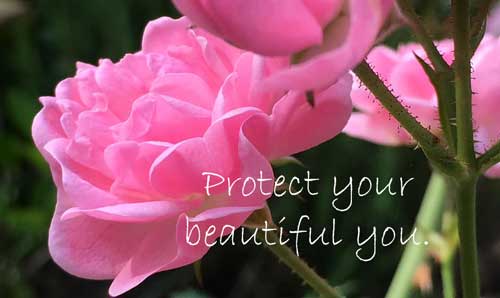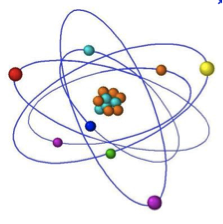
There are many reasons that healthy boundaries are important. I learned this the hard way. Several years ago, I met someone who I was immediately attracted to. He was charismatic, polite, had a good sense of humor. We seemed to have a lot in common. During the first month or so he disclosed a lot of personal information. I remember feeling a twinge a few times with only a slight inkling that something made me uncomfortable. I was in the habit of dismissing my feelings due to being in a toxic relationship for many years. Because of this, I ignored my gut and continued receiving and sharing intimate things with this person. Sharing personal information with others can make us feel connected, but what about when the people you share with have toxic traits? What you share could and likely will be held against you. Oftentimes traits from the ‘dark triad’ personality cluster including narcissism, psychopathy, borderline personality disorder and Machiavellian, are at the core of boundary violation. The common denominators to these traits are behaviors that put personal needs and interests before the needs and interests of others, especially to gain control.
Boundary setting is essential to health, strength and healing.
We need healthy boundaries in order to form healthy relationships with others and without becoming enmeshed or dissociated. Without boundaries, we are open for the control of others as they try to place their will on us. We tend to struggle with knowing how and where to draw the line or even what our boundaries are. Our boundary marks the limit between us and everything else. Boundaries are what protect us, make us unique, help us define and live the life we desire. Our health is directly related to establishing healthy boundaries. What we are talking about goes beyond physical boundaries, which are easy enough to define. We all take precautions to protect our physical boundaries. More now than ever we wash our hands, brush our teeth, cover our mouth when we sneeze and expect others to do the same. Most people lock the doors to their homes and some learn self-defense. We have an understanding of non-physical boundaries because we know to protect our intellectual boundaries, our private information, and our financial information. But setting healthy boundaries must include emotional and psychic limitations as well.
The Difference Between Healthy Boundaries and Unhealthy Boundaries
Think of your boundary in terms of an energy field that surrounds you and includes every aspect of you.
We live in an energy field, we are a manifestation of energy and we are surrounded by energy at all levels. LIterally everything is either energy or matter. In fact, according to Albert Einstein, energy and matter are interchangeable. Matter is actually still energy, just lower frequency levels.
“Concerning matter, we have been all wrong. What we have called matter is really energy, whose vibration has been lowered as to be perceivable to the senses.” -Albert Einstein
We are constantly exposed to all kinds of energies, but in our human bodies, we are limited to the way we can logically interpret and measure energy through our five senses (sight, sound, taste, touch, smell). Our sense of balance may provide a sixth somewhat measurable sense, and intuition is certainly a sense but we cannot accurately measure intuition yet. Energy constantly bombards our sensory systems. Without healthy boundaries, when we are exposed to negative energies, including those of other people’s emotions. It is possible to absorb them and become ‘infected’ with lower levels of energy ourselves. Lower frequency energies are counter productive and are characterized by a lack of light. Base emotions such as hate, pity, greed, jealousy, anger, or apathy resonate at very low levels and are said to be devoid of light. This level will literally bring us down, drain us, and make us feel depleted. On the contrary, more productive and positive levels of energy vibrate at higher frequencies and are associated with emotions of love, acceptance, generosity, trust, joy and inspiration. Love is filled with light.
Recognizing when our boundaries are violated can be tricky.
We have been conditioned to ignore boundary violations. We can recognize when our boundaries are off-center or being crossed by paying attention to our own feelings. Our emotions and our bodies give us signals and warning signs. Someone who has experienced boundary violations can become blind to these signals because they have been programmed to disregard the physiological sensations and even emotions that are faithfully brought to our attention by our own bodies and soul. Being raised in a toxic household, or being in a toxic relationship numbs the senses through the systematic and repeated manipulation of others for the purpose of control. There are emotions that are generally targeted and therefore important to pay attention to. These are fear, obligation, and guilt (F.O.G.). Some of the offshoots from these feelings are stress, anger, anxiety, depression, apathy, resentment, and discomfort. When others take advantage of us, or don’t validate our experiences our brain releases charged emotions to get our attention, which often feel like confusion, or any of the other forenamed emotions. Is there anyone in your life with whom you feel a sense of fear, obligation or guilt? Who do you have a difficult time saying no to? Is there anyone with whom you feel nervous, resentful or anxious?
Boundary violation means being at the whim of others.
A violation to our boundary might result in unconsciously allowing other people’s feelings and moods to dictate your own. If you notice that you are responding to, or changing your behavior based on someone else’s emotional state such as anger, sadness, or indifference take that as a sign that there may be an area in your own boundary that could benefit from your attention. Besides sacrificing your own needs and wants to avoid or alter the moods of others, look for signs of boundary imbalance. Include taking responsibility for other people’s feelings, and blaming others for your issues. Sometimes behaviors can be so routine, or so subtle that they go unnoticed for years until we finally become conscious of what is happening. You might find it easier to just give in to someone rather than have to deal with their reaction. The reaction you fear might be anger or punishment in some form. You may not label your reaction as fear based at all, but rather more of an avoidance to something like their sadness, or possible pestering.
What causes broken boundaries?
We begin to form boundaries early in life. One of the first developmental stages includes an understanding of physical separation from mom, recognizing that we are in fact an individual not connected to our mother. Our families first teach us about our boundaries by reflecting our experiences, meeting or not meeting our needs and wants. We learn to recognize the safety of asserting our wants and needs. As we grow we continue to learn ways to verbalize and express our feelings. When parents who are struggling with their own issues and lack the capacity to provide feedback, reinforcement, or attention then the child finds alternative ways to get their needs met. The energy field has essentially been distorted or disorganized. Any traumatic experience can pierce holes in our energy field, reshaping the field to be weak in certain areas and consequently negatively reinforcing others areas with defenses and avoidance tactics. This causes a sort of lop-sidedness or imbalance. It also causes a propensity to higher sensitivity to others’ energy fields including stress, moods and emotional states. Weakened or imbalanced boundaries can also result from abandonment. We have a fundamental need as humans to attach to our caregivers. When that is not possible, our boundaries are left with a gaping hole, which human nature wants to fill with anything possible. We can become prone to unhealthy attachments to other people or things, leaving us vulnerable and exposed to danger.
Let’s explore the concept of broken or weakened boundaries in terms of the principles of nature. In the physical and energy world things need to be in balance, which means two equal opposing forces. (see my previous blog on How Physics Relates to Mental Health). An eggshell is a pretty good visual for this because we can imagine how that thin shell responds depending on the inside structure. A raw egg is pretty fragile and can break easily if dropped or banged on the side of a bowl. Eggshells that have been emptied of their insides are even more fragile because there is nothing on the inside pushing against any external force, so the slightest pressure will shatter the shell. Imagine a more flexible exterior surface, like that of a balloon. Depending on the pressure, or how much air is inside, it could either explode or with impact or it becomes stretched, misshapen or thinned.


Now, apply this image to a three dimensional model on any level from a molecular level with protons and electrons orbiting around a nucleus, or a cellular structure of any living organism, to the level of the solar system. This oversimplified concept provides a metaphorical model of balance in nature. Healthy boundaries must have balance between internal and external forces. That means internally you need to have as much certainty about your experiences, feelings, wants and needs as others’ impositions on you in order to stay balanced.



Creating boundaries and clearing our energy fields
When is setting limits mean and selfish and when is it strengthening? For example, if someone in need is politely asking for something that we might not have the resources for, we might try to provide and comply out of a sense of obligation or compassion. This is where our body signals come into play and we need to pay attention. Sometimes shoulders tighten up or there may be a feeling of a knot in the stomach. This is the subconscious sending signals through the body telling us that we need to implement some healthy boundaries, or we are in danger of depleting our resources. We can so easily become blind to our own needs. We might be accustomed to attending to the needs of others for many different reasons. Sometimes we get sensitized to the possible negative reactions of others and automatically reply with what may seem to cause the least amount of backfire, even if it means overextending ourselves. We unconsciously allow others to invade our space, personal business,
But our body’s signal could be trying to bring out attention to our needs. Consider the consequences to ourselves and to let go of others’ reactions, including their consequential negative emotions. After this consideration and weighing out of end results, you might want to gracefully decline. If you are not used to saying no or drawing your own boundaries this can feel uncomfortable and scary. It takes practice. It helps to begin establishing a repertoire of responses. Here are a few that can serve as examples: “I’m sorry, I would love to be able to, but I do not have the resources/time/ability.” Or: “Thank you for asking me but I have too much on my plate right now.” “I’m not really good at/into [home shopping parties/selling things/crafts/etc] but thank you for thinking of me.”
Figure out your boundaries. What you are willing and unwilling to accept, do, believe, think, etc. This can be enhanced through self-awareness. Pay attention to your feelings. Your emotions are there to tell you something about yourself. Notice when FOG gets in the way. FOG is fear, obligation or guilt. Maybe you fear saying no to someone or expressing your beliefs, because it might hurt their feelings, or there may be negative consequences. There might be a sense of obligation that you ‘should’ do something or be there for someone even when you’re drained. Examine this because it could go back to what we discussed earlier about those who strategically design a sense of obligation to maintain control and a feeling of indebtedness. Pay attention to your actions and notice when you are responding because of a feeling of fear, obligation or guilt. Remember, enforcing your boundaries does not make you a bad person, it makes you a healthy person.
